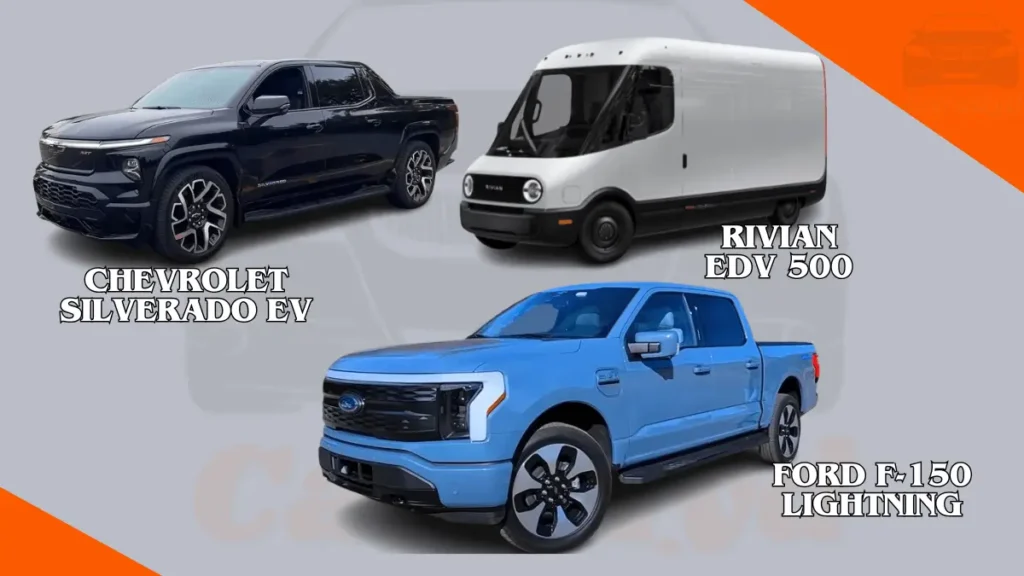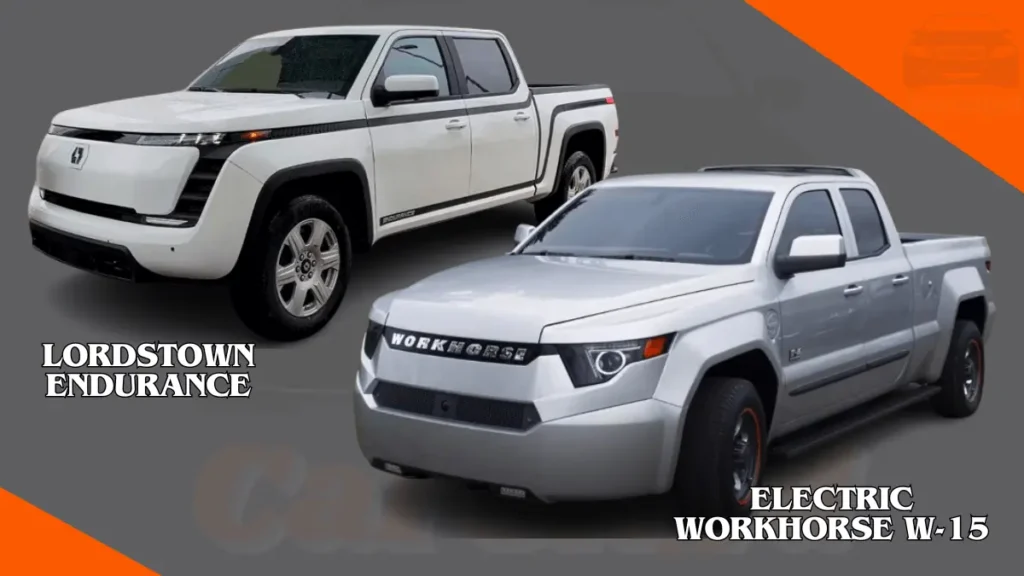The Power of Small Electric Work Trucks
As a business owner, you’re constantly looking for ways to improve efficiency while reducing costs. You’re also becoming more aware of the growing demand for sustainability. Enter the world of small electric work trucks a solution that allows you to reduce your environmental impact while boosting operational efficiency. These vehicles are designed to meet your business needs, from carrying heavy loads to navigating city streets, all while cutting fuel costs and minimizing maintenance. The best part? They’re eco-friendly, which can enhance your brand’s image as a forward-thinking, green enterprise.
In this article, we’ll dive into the key benefits, features, and considerations of integrating small electric work trucks into your business. We’ll guide you through the process of choosing the right model, examine real-world applications, and provide insight into how these trucks can help future-proof your operations.
Table of contents
- The Power of Small Electric Work Trucks
- Understanding Small Electric Work Trucks
- Benefits of Small Electric Work Trucks for Businesses
- Choosing the Right Small Electric Work Truck for Your Business
- Real-World Applications and Case Studies
- Overcoming Challenges of Small Electric Work Trucks
- The Future of Your Business Is Electric
- Frequently Asked Questions (FAQs)
Understanding Small Electric Work Trucks
What Are Small Electric Work Trucks?
Small electric work trucks are commercial vehicles powered by electric batteries, designed to transport goods, tools, or equipment for various businesses. These trucks come in a variety of sizes, but the small electric work truck is perfect for urban deliveries, service work, and light-duty hauling. Unlike their larger counterparts, these trucks are compact and agile, making them ideal for businesses that require maneuverability in tight spaces and busy city streets.
The key difference between a traditional gas-powered work truck and an electric one is that electric trucks run on electricity rather than gasoline or diesel, offering significant advantages in terms of fuel costs, maintenance, and environmental impact.
Key Features of Small Electric Work Trucks
When evaluating small electric work trucks, it’s important to focus on several key features:
- Battery Capacity: Electric trucks rely on high-capacity lithium-ion batteries to power their motors. The capacity of the battery directly affects how far the truck can travel on a single charge. Most small electric work trucks offer ranges between 100 and 250 miles, which is suitable for urban deliveries and light-duty work.
- Payload Capacity: Payload refers to the maximum weight the truck can carry. A small electric work truck typically has a payload capacity between 1,000 and 4,000 pounds. It’s important to match the truck’s payload to your business needs.
- Charging Options: Small electric trucks are designed for easy charging. While most can be charged at home with a standard Level 2 charger, they can also be charged at public charging stations. Fast-charging options can charge the vehicle up to 80% in 30-45 minutes, making it a practical solution for businesses with frequent operational needs.
Benefits of Small Electric Work Trucks for Businesses
Switching to small electric work trucks offers several distinct advantages that can enhance your business’s bottom line and image.
Cost Savings Over Time
Lower Fuel Costs
Electric trucks provide an incredible opportunity for savings on fuel. According to the U.S. Department of Energy, driving an electric truck costs roughly $0.13 per mile, which is significantly cheaper than the cost of gas or diesel fuel, which can range from $0.15 to $0.25 per mile depending on fuel prices. Over time, these savings can add up significantly, especially for businesses that depend on trucks for daily operations.
Reduced Maintenance Costs
Electric trucks have fewer moving parts compared to traditional internal combustion engine (ICE) vehicles. This results in lower maintenance costs as there are fewer components that wear out. There are no oil changes, no transmission issues, and fewer brake replacements because electric trucks use regenerative braking to recharge the battery.
Tax Incentives and Rebates
Governments around the world are offering tax credits and incentives to businesses that switch to electric vehicles. In the U.S., federal tax credits can be as high as $7,500, and some states provide additional rebates and tax credits for purchasing electric trucks. This can help offset the initial investment cost and make the transition to electric even more financially viable.
Environmental Impact
Zero Emissions
One of the most significant benefits of electric work trucks is their zero emissions. Since these trucks don’t burn fossil fuels, they produce no tailpipe emissions, helping reduce your business’s carbon footprint. If your company is focused on sustainability, using electric trucks will align with your values and help you meet emissions targets.
Sustainability and Green Image
Consumers today are more conscious of the environmental impact of the businesses they support. By adopting small electric work trucks, your company not only reduces its carbon footprint but also improves its green credentials. Whether it’s clients, employees, or investors, a commitment to sustainability can strengthen your brand and attract environmentally-minded customers.
Choosing the Right Small Electric Work Truck for Your Business
When selecting the right small electric work truck, it’s essential to match the vehicle’s features with your business’s specific needs.
Key Considerations
Range and Charging Needs
Consider how far your trucks need to travel on a typical day. If your business operates within a specific geographic area, range might not be as big a concern. However, if you’re planning on using your trucks for longer trips, you’ll need to choose a model with a range that suits those needs. Also, check the availability of charging stations along your routes to ensure the vehicle stays powered throughout the day.
Payload Requirements
Make sure that the truck’s payload capacity matches the weight of the materials you need to carry. Overloading an electric truck can reduce its efficiency, so ensure you’re choosing a model that can handle your typical load.
Budget Considerations
While electric trucks can be more expensive upfront than gas-powered trucks, consider the long-term savings on fuel and maintenance. Additionally, tax credits can help reduce the initial investment. Many electric vehicle manufacturers also offer financing options or leasing programs, which can help spread out the cost.
Popular Models to Consider


Here are some of the top small electric work trucks currently available on the market:
| Model | Range | Payload Capacity | Price Range | Key Features |
|---|---|---|---|---|
| Ford F-150 Lightning | 230-300 miles | 2,000-3,000 lbs | $39,974 – $90,000 | High towing capacity, fast charging, rugged design |
| Rivian EDV 500 | 150 miles | 3,500 lbs | $67,500 | Customizable for different industries, large cargo space |
| Chevrolet Silverado EV | 400 miles | 1,000-2,000 lbs | $39,900 | Robust build, 10,000 lbs towing capacity |
| Lordstown Endurance | 250 miles | 3,500 lbs | $52,500 | Designed for fleet use, rugged, and highly durable |
| Electric Workhorse W-15 | 150 miles | 2,000 lbs | $52,000 | Versatile, great for urban deliveries, quick charging |
Real-World Applications and Case Studies
Industry Use Cases
Delivery Services
Small electric work trucks are perfect for last-mile delivery. Companies like Amazon and UPS have already started integrating electric delivery trucks into their fleets. These vehicles provide a quiet, eco-friendly alternative for making deliveries in urban areas, reducing emissions, and improving operational efficiency.
Construction and Landscaping
Electric work trucks are also well-suited for construction and landscaping businesses. They can transport tools, equipment, and materials around job sites with minimal emissions, helping companies meet environmental regulations while increasing productivity.
Utility and Maintenance Services
Electric trucks are also being used in utility maintenance and service industries, providing businesses with a reliable vehicle for tasks such as service calls, equipment transport, and maintenance work—all without the burden of high fuel costs or emissions.
Testimonials from Business Owners
- James, Owner of a Local Delivery Business: “Switching to electric trucks has saved me thousands in fuel costs every year. Plus, my clients love that we’re reducing our carbon footprint.”
- Sarah, Landscaping Company Owner: “The electric trucks we use are perfect for navigating city streets and doing the work we need without all the noise and pollution.”
Overcoming Challenges of Small Electric Work Trucks
While small electric work trucks come with numerous benefits, there are some challenges that businesses may face.
Addressing Range Anxiety
One of the biggest concerns for businesses adopting electric vehicles is range anxiety the fear that the vehicle will run out of battery before reaching a charging station. However, this issue is becoming less of a concern as the electric vehicle infrastructure grows. Many businesses can plan routes to ensure their trucks are always within range of a charging station.
Initial Investment Concerns
While the upfront cost of electric trucks can be higher than that of traditional vehicles, the savings on fuel and maintenance make the transition well worth it. Additionally, many manufacturers offer financing and leasing programs that can help reduce the initial financial burden.
The Future of Your Business Is Electric
Small electric work trucks are no longer just a futuristic concept they are a practical, efficient, and environmentally friendly solution for businesses of all sizes. By making the switch to electric, you can not only cut costs and improve your operational efficiency, but also position your company as a leader in sustainability. With the variety of models available and government incentives to help offset the cost, now is the perfect time to integrate electric work trucks into your business operations.
Frequently Asked Questions (FAQs)
1. What are small electric work trucks?
Small electric work trucks are compact, battery-powered vehicles designed to carry goods, tools, or equipment for businesses. They are ideal for urban deliveries, service work, and light-duty hauling, offering eco-friendly alternatives to traditional gas-powered trucks.
2. How much does a small electric work truck cost?
The cost of a small electric work truck can range from $30,000 to $90,000, depending on the model, features, and payload capacity. While the initial investment may be higher than a traditional truck, electric trucks offer significant savings in fuel and maintenance over time, making them a smart long-term investment.
3. How far can small electric work trucks travel on a single charge?
The range of small electric work trucks typically ranges from 100 to 300 miles on a full charge, depending on the model and battery capacity. For most businesses that use trucks for urban or short-distance deliveries, this range is more than adequate.
4. Are there government incentives for purchasing small electric work trucks?
Yes, many countries, including the U.S., offer federal tax credits, state rebates, and incentives for businesses that purchase electric vehicles. In the U.S., federal tax credits can be as high as $7,500, and some states offer additional incentives to make electric trucks more affordable.
5. What are the main benefits of small electric work trucks for businesses?
The main benefits include:
- Lower fuel costs: Electric trucks cost significantly less to operate than gasoline-powered trucks.
- Reduced maintenance: Fewer moving parts mean lower long-term maintenance costs.
- Zero emissions: Help your business meet sustainability goals and reduce your environmental impact.
- Tax incentives: Take advantage of government rebates and credits to offset the initial cost.
6. Can small electric work trucks handle heavy loads?
Yes, small electric work trucks are designed to carry a variety of payloads. Many models offer payload capacities between 1,000 to 4,000 pounds. However, it’s important to choose a model that matches your business’s specific payload needs to ensure optimal performance and efficiency.
7. How long does it take to charge a small electric work truck?
Charging times vary based on the charging method. With a Level 2 charger, it typically takes between 4 to 8 hours to fully charge an electric truck. Fast-charging options can charge the vehicle up to 80% in 30-45 minutes, making it suitable for businesses that need quick turnarounds.
8. Can small electric work trucks be used for long-distance travel?
While small electric work trucks are primarily designed for short to medium distances, some models offer a range of over 300 miles per charge, making them suitable for longer trips. However, it’s essential to plan for charging stations along your route to ensure a smooth journey.
9. What types of businesses benefit most from small electric work trucks?
Small electric work trucks are especially beneficial for:
- Urban delivery businesses: They are ideal for navigating city streets and reducing emissions in crowded areas.
- Construction and landscaping companies: They can transport tools and materials to job sites without the environmental impact of traditional trucks.
- Maintenance and service companies: Small electric trucks are perfect for local service calls and light-duty hauling.
10. Are there financing options for purchasing small electric work trucks?
Yes, many manufacturers offer leasing or financing options to help businesses offset the initial investment. Additionally, government incentives and rebates can further reduce the cost, making it easier to integrate electric work trucks into your fleet.
11. Do electric work trucks require special maintenance?
Electric trucks have fewer moving parts compared to gasoline-powered vehicles, so they generally require less maintenance. However, you should still regularly check the battery and charging system, as well as the brake pads and tires. Many electric trucks also use regenerative braking, which can extend the lifespan of the brake system.
12. Can small electric work trucks be used in extreme weather conditions?
Yes, many small electric work trucks are designed to perform well in various weather conditions, including snow, rain, and extreme temperatures. However, extremely cold temperatures can affect battery efficiency, so it’s important to plan for battery management, especially if you operate in colder climates.
13. What is the lifespan of a small electric work truck’s battery?
The lifespan of an electric truck battery typically ranges between 8 to 15 years, depending on the usage and maintenance of the vehicle. Most manufacturers offer warranties on their batteries for 8 years or up to 100,000 miles, ensuring that your investment is protected.
14. Are small electric work trucks safe?
Yes, small electric work trucks are generally as safe as traditional vehicles. They are equipped with safety features like airbags, stability control, and collision avoidance systems. Additionally, many electric trucks have a lower center of gravity due to their battery placement, which can provide better stability on the road.
15. How can I incorporate small electric work trucks into my existing fleet?
Integrating small electric work trucks into your fleet can be done gradually. Start by replacing one or two of your older, gas-powered vehicles with electric models. You can then assess their performance, cost savings, and impact on your business. Over time, you can expand your electric fleet as you experience the benefits.














